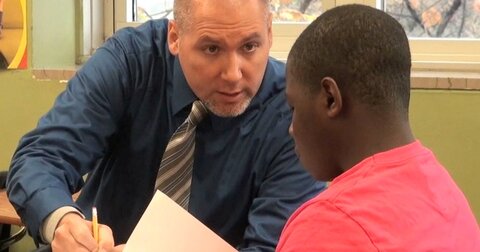Detroit Charter School Parents: Don’t Take Away Our Freedom to Choose
'Let them flourish' says parent about charter schools
Educational choice in Detroit is worth the fight. That's the message from 11 Detroit-area families whose children attend charter schools and spoke to the Mackinac Center for Public Policy about a proposal to limit public charter schools in the city. The Mackinac Center met with the families at their homes and at schools so they could publicly share their views on school choice.
“Let them flourish,” said Corey Hughes, who has had experience with charter schools first as a father and now as a grandfather.
A coalition of foundations, public school officials and other interests has proposed centralizing control of Detroit's charter and conventional public schools under a commission that would create a common enrollment system. The commission would be given the power to determine which children would attend which schools, whether any new charter schools could open in the city, and even whether existing charters would be allowed to remain.
Calling itself the “Coalition for the Future of Detroit Schoolchildren,” the group convened last year to make recommendations for state policymakers. Gov. Rick Snyder is expected to release a plan that would set new standards for conventional and charter schools.
Detroit-area families who support having the ability to choose which school their children attend say this right is incredibly important, and that limiting charter school growth would be the wrong move.
Tamika Harrison pulled her son out of Detroit Public Schools because she was worried they were “going down.” Harrison said she formed her views while working as a school bus driver.
“I dealt with a lot of teachers and didn’t like some of the attitudes,” said Harrison.
Her son now attends a charter school and while she thinks his grades could be higher, she thinks that her son is being challenged.
“I love the academy schools. I love the teachers. I love how they are into the students than the results I was getting from Detroit Public Schools,” said Harrison.
Toya Putman loves the Roseville charter where she sends her second grader. Next month, her family is moving back to Detroit from Warren, in part because she continues to send her son to the school.
“My husband and I decided that we would not place our children in public schools unless the curriculum meets our personal requirements,” said Putman, who will continue to send her children to the Roseville charter even if they do return to the city.
Other parents addressed some of the other concerns about charter schools, such as transparency and the difficulty of navigating choices.
“I don’t think it’s hard finding charters with technology today, and computers,” said Detroit parent Tress Andrews. Her daughter attends a Detroit charter that emphasizes the performing arts.
Danielle Harrison grew up in Detroit but now lives in Eastpointe where her son attends a charter school. On transparency, she says the results speak for themselves.
She is shopping around for a new school for her 10-year old son because his grades have been slipping.
“I don’t think that every school is the right school for each child,” she said.
The Mackinac Center has created a Web page for policymakers to hear the stories of these Detroit families. Most of the parents are products of DPS. Some describe how they were inadequately prepared for college. Others say they chose charters because they were impressed with the curriculum, or the smaller class sizes. For others, it was better start times or concerns about security.
Currently, there are 66 charter schools in Detroit. The Michigan Association for Public School Academies says the data show that charters tend to live and die by their results.
According to the association, from 1995 to 2014, 7.2 charters schools opened on average every year. In 2011, when Michigan removed the cap on charters, charter school openings increased 33 percent. School closings have jumped 100 percent from 2011 and beyond, suggesting that accountability — from the added competition — was occurring naturally.
“The data does not reflect a wild west, free-for-all of rapid, unchecked growth,” said Julie Durham, MAPSA's director of research.
Most public charter schools in Michigan are authorized by state universities. By the original law, only 150 charter schools could be authorized by state universities. But a 2011 law gradually raised the cap, and eliminated it as of this year. Conventional public schools and their allies have become increasingly active in the Legislature, the media and elsewhere in pursuit of new restrictions and limits on charter schools.
Michigan Capitol Confidential is the news source produced by the Mackinac Center for Public Policy. Michigan Capitol Confidential reports with a free-market news perspective.


 Detroit Achievement Academy wins $500K Yass Prize as finalist
Detroit Achievement Academy wins $500K Yass Prize as finalist
 Detroit school district took 73 days to produce public records
Detroit school district took 73 days to produce public records
 Charter school advocate says state education board accusations inaccurate
Charter school advocate says state education board accusations inaccurate